|
|
|
Sort Order |
|
|
|
Items / Page
|
|
|
|
|
|
|
| Srl | Item |
| 1 |
ID:
161003
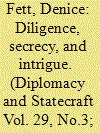

|
|
|
|
|
| Summary/Abstract |
The traditional description of the 1559 Treaty of Cateau-Cambrésis that marked the end of the Italian Wars is that it was the logical culmination of a generation’s worth of warfare. However, this interpretation dismisses the fact that most contemporaries feared that the 1558–1559 negotiations could produce no peace more permanent than other recent treaties between the Spanish Hapsburgs and French Valois, and that the actual process of negotiation happened along several parallel channels. In particular, the new English government under Queen Elizabeth I used the negotiations, and the services of an unofficial diplomatic agent, to explore the possible terms of peace and to begin establishing relations with both France and Spain.
|
|
|
|
|
|
|
|
|
|
|
|
|
|
|
|
| 2 |
ID:
161044
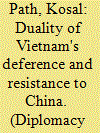

|
|
|
|
|
| Summary/Abstract |
Critically reviewing David Kang’s China-centred hierarchical model, his interpretation of historical interactions between China and Vietnam favours Sinocentrism whilst claiming to rescue historical East Asian international relations theories from Eurocentrism. This analysis provides a nuanced account of Vietnam’s agency in pursuing its national interests in the context of a rising China, showing that Vietnam today continues to draw on the historical tradition of deference/resistance to China to orient its strategies and tactics in dealing with its northern neighbour. Vietnam’s stance toward China is akin to balancing Great Power influence, which entails enlisting other Great Powers to defend its core interests vis-à-vis China. The result is that Vietnam simultaneously pursues a mixture of deference and resistance to China that does not resemble balance of power—against China, or balance of threat—bandwagon with China's behaviours.
|
|
|
|
|
|
|
|
|
|
|
|
|
|
|
|
| 3 |
ID:
161000
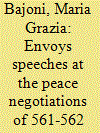

|
|
|
|
|
| Summary/Abstract |
The most prominent feature of ancient historiography appears to be the matching and welding of two essential components: narrative and speech. The rhetorical feature of envoys’ speeches should not encourage the belief that they are mere literary evidence, as their presence in the narration is normally proportional to the historian’s interest in diplomatic events. This analysis focusses on envoy speeches during the negotiations of the peace treaty of 561–562 AD between Emeror Justinian I and the Persian King Khosro I as reported by the Byzantine historian Menander the Guardsman in the fragment 6.1 of his History. Since no documents survived after the destruction of the Byzantine archives, Menander’s documents are a precious witness. The envoy’s speech was not a distinct rhetorical genre; rather, it developed from the epidictic discourse for petitions and praise during the Hellenistic and Roman eras as a means of political communication between provincial cities and the central administration. Indeed, a fiction of internationality shaped the language of Roman diplomacy until late Antiquity. The speeches delivered by Roman and Persian delegates before laying down the treaty of 561–562 display discursive strategies articulated on the sharing of communal political and moral values.
|
|
|
|
|
|
|
|
|
|
|
|
|
|
|
|
| 4 |
ID:
161016
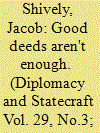

|
|
|
|
|
| Summary/Abstract |
Iran enjoyed some of the earliest fruits and efforts of the Point Four programme, an initiative borne out of President Harry Truman’s 1949 inaugural address. Over the last decade, a robust literature on development theory and American foreign policy has emerged. That research reveals complex motivations and agendas. Point Four in Iran, specifically, offers a discrete, early picture of America’s broader effort to utilise technical assistance to elevate poor peoples’ standards of living and inoculate poor states from communist appeals. It is one of the landmark programmes during this genesis period. The Iranian government was amongst the first that the State Department approached to establish technical aid under this initiative, and, indeed, American aid to Iran continued into the 1970s. By mid-1953, however, larger and more direct aid absorbed this specific assistance and development effort to bolster the shah’s government, which gained secure power after an American Central Intelligence Agency and British intelligence—MI6—backed coup that same year. Scholars have argued that Truman’s foreign aid innovations reshaped United States foreign policy. The Point Four programme in Iran, however, also reveals the limits of that revolution.
|
|
|
|
|
|
|
|
|
|
|
|
|
|
|
|
| 5 |
ID:
161042
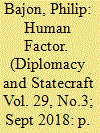

|
|
|
|
|
| Summary/Abstract |
This analysis reviews a crucial moment in the contemporary political and constitutional history of Western Europe. Prior to the “empty chair crisis” in 1965–1966, an important Franco–West German summit had failed and allowed the French president, Charles De Gaulle, to jeopardise negotiations in the European Economic Community. This analysis not only illustrates the overwhelming importance of Franco–West German bilateralism in the prelude to the crisis, but also analyses the negotiating behaviours of De Gaulle and West German Chancellor Ludwig Erhard at the summit of 11–12 June 1965. Contrary to conventional wisdom, Erhard, rather than the allegedly anti-European De Gaulle, doomed the negotiations. Furthermore, this study draws pragmatically on social institutionalism and constructivism to shed light on Erhard’s mental map and identify the relevant considerations in his decision-making and bargaining. Rational choice approaches fail to explain the “human factor” in Erhard’s negotiating behaviour and the mysterious breakdown of Franco–West German entente in summer 1965.
|
|
|
|
|
|
|
|
|
|
|
|
|
|
|
|
| 6 |
ID:
161006
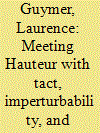

|
|
|
|
|
| Summary/Abstract |
This article takes a broad view of Anglo–Russian relations in the years between the Peace of Paris, 1856, and the death of Viscount Palmerston, 1865, examining the shifts within that period in an essentially high-political diplomatic history. It traces a number of strands in geopolitics, offering a sense of the competing strategies of the European Great Powers, particularly the roles of British diplomats: the private and public communication amongst prime ministers, foreign secretaries, ambassadors, ministers-plenipotentiaries and consular officials concerning British policy towards Russia in the post-Crimean War period. It outlines the principles that underlay that policy and the ways in which the diplomatic network observed the tsar and his advisors and agents, assessed the developing situation in Russia, Central Asia, and the Ottoman Balkans, made decisions, and implemented policy. It focusses on the diplomatists’ attitudes and perceptions—how they thought about Russia and British interests and how they worked to protect them. It also analyses British policy in light of the European dimension. The years 1856 to 1865 not only witnessed Russian attempts to undermine the Crimean settlement, they also saw revisionist Bonapartist France work to destroy the constraining Vienna system of 1815—primarily in northern Italy. These policies complicated British attempts to maintain the status-quo and defend their interests in the East. The evolving situation was highly complex.
|
|
|
|
|
|
|
|
|
|
|
|
|
|
|
|
| 7 |
ID:
161043
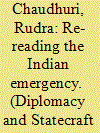

|
|
|
|
|
| Summary/Abstract |
The period known as the “Emergency” in India—June 1975 to March 1977—is widely recognised as one of the darkest episodes in the nation’s 70-year history. Fundamental rights were suspended, whilst the courts had little or no authority. The security services received emergency powers to make arrests without explanation. Although the political, social, and economic history of the Emergency remains well known, there is nothing on the international history of this period. This analysis provides the first contribution to its diplomatic history. Examining the role played by the United States and Britain, in particular, finds basis largely on declassified papers available in the Indian, American, and British national archives as well as a survey of over 300 newspaper articles on and around the Indian Emergency.
|
|
|
|
|
|
|
|
|
|
|
|
|
|
|
|
| 8 |
ID:
161045
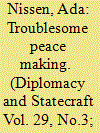

|
|
|
|
|
| Summary/Abstract |
Weak mediators normally need to borrow leverage from more powerful players to provide efficient mediation. This situation requires strong co-operation between the weak mediator and more powerful actors or coalitions involved in a peace process. But what if this co-operation fails? This analysis demonstrates how lack of productive co-operation with the United States negatively affected Norway’s 9-year-long attempt to mediate in the conflict between the Sri Lankan government and the Liberation Tigers of Tamil Eelam between 2000 and 2009. More specifically, it explores how the United States views on terrorism in the aftermath of the terrorist attacks on 11 September 2001 limited Norway’s room for diplomatic manoeuvre. Based on a unique set of classified sources from the Norwegian Ministry of Foreign Affairs and interviews with key actors, the analysis demonstrates how diverging perceptions of a conflict can make mediation painfully challenging.
|
|
|
|
|
|
|
|
|
|
|
|
|
|
|
|
| 9 |
ID:
161017


|
|
|
|
|
| Summary/Abstract |
Drawing on declassified sources, this analysis examines how the Cold War influenced United States policy towards the creation of the European Atomic Energy Community [EURATOM]. In the 1950s, “the peaceful atom” became a crucial sector of the Cold War. To maintain American nuclear leadership, the Dwight Eisenhower Administration invited Western Europeans to enter into an active collaboration with the United States on peaceful uses of atomic energy. The United States encouraged the creation of EURATOM by promising that the Community would obtain more assistance in the nuclear field than any individual state. The Soviet launch of Sputnik provided additional impetus to the signing of the United States–EURATOM agreement, having strengthened American interest in a joint programme with EURATOM that would bring together American and Western European scientific and technical resources to counter the Soviet Union. The exegesis contributes to recent studies on the interaction between the Cold War and European integration.
|
|
|
|
|
|
|
|
|
|
|
|
|
|
|
|
|
|
|
|
|